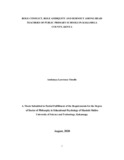Please use this identifier to cite or link to this item:
http://ir-library.mmust.ac.ke:8080/xmlui/handle/123456789/1399Full metadata record
| DC Field | Value | Language |
|---|---|---|
| dc.contributor.author | Ambunya, Lawrence Omollo | - |
| dc.date.accessioned | 2020-11-02T09:12:36Z | - |
| dc.date.available | 2020-11-02T09:12:36Z | - |
| dc.date.issued | 2020-08-24 | - |
| dc.identifier.uri | http://r-library.mmust.ac.ke/123456789/1399 | - |
| dc.description.abstract | Research has shown that role conflict and role ambiguity are associated with burnout among head teachers of public schools and general educators. However, there is scanty literature from previous studies examining the relationship between role Stressors and burnout among head teachers of public primary schools in Kakamega County, Kenya. Role conflict refers to incompatibility of expectations and demands associated with the role while Role ambiguity refers to a lack of clear information associated with a particular role played by the head teacher.The purpose of the study was to establish the relationshipbetweendemographic variables, role stressors and head teacher burnout. The study objectives include:to establish the existence of different dimensions of burnout among head teachers of public Primary schools in Kakamega County; find out the relationship between demographic factors and different dimensions of burnout; determine the relationship between demographic variables and role stressors; determine the relationship between role stressors and different dimensions of burnout; find out the relationship between role stressors and overall burnout and to establish the mitigating strategies to burnout among head teachers. The study was based on Role Stress Theory, Existential Theory, and the Sociological PerspectiveTheory.Descriptive and Correlation research survey designs were used. Systematic random, stratified and purposive sampling techniques were used to collect data. Instruments of data collection includedthe Head teacher Demographic Information Questionnaire (HTDIQ), the Role Questionnaire (RQ), theMaslach Burnout Inventory-Education Survey (MBI-ES), theBurnout Intervention Strategies Questionnaire (BISQ) in eclectic form.Qualitative data from Headteachers and Sub–County Quality Assurance and Standards Officers (SQASOs) was collected using Interview Schedules.A pilot study was conducted to ascertain the validity and reliability of the instrumentsfor data collection.The reliability Coefficient(r)for the eclectic Questionnaire was found tobe above the recommended 0.07. The target population was 855head teacherswhile the sample population was 261 head teachersand 11 SQASOs. The head teacherscompleted the Eclectic Questionnaire andin-depth interviewsconductedon head teachers and SQASOsusing the respective interview schedules.Collected data was sorted, edited, coded, entered and tabulated. Data analysis was guided by the study objectives. Correlation and Multiple regression analysis were conducted to examine thedirection, strength and significance of therelationships between the variables at significance levelα =.05.The Statistical Package for Social Sciences (SPSS) version 26.0 was used to analyze the data. Data was presented in tabular and graphical form. The study findings reveal that head teachers suffered from emotional exhaustion, depersonalization and reduced personal accomplishment.It was also established that the relationship between demographic factors and burnout was insignificant.However, the relationship between role stressors and burnout was found to be statistically significant and the burnout level moderate. It was further established thathead teachers used social support as the main intervention strategy to burnout. The findings of the study may add facts to the body of knowledge on burnout among head teachersandbe usefulfor further research. The recommendations made from the findings of the study may be useful in policy formulationat the Teachers Service Commission (T.S.C) and Ministry of Education (MoE) on intervention strategies to address the burnout menace.It’srecommended thatTSC regularly offerin-service training to H/Ts onemerging roles and promote those who acquire higherprofessional qualifications. | en_US |
| dc.description.sponsorship | MMUST | en_US |
| dc.language.iso | en | en_US |
| dc.publisher | MMUST | en_US |
| dc.subject | Relationship, Role Ambiguity, Role Conflict, Burnout, Head Teachers, Public Primary, Schools. | en_US |
| dc.title | ROLE CONFLICT, ROLE AMBIQUITY AND BURNOUT AMONG HEAD TEACHERS OF PUBLIC PRIMARY SCHOOLS IN KAKAMEGA COUNTY, KENYA | en_US |
| dc.type | Thesis | en_US |
| Appears in Collections: | School of Education | |
Files in This Item:
| File | Description | Size | Format | |
|---|---|---|---|---|
| AMBUNYA-Thesis.pdf | 2.32 MB | Adobe PDF |  View/Open |
Items in DSpace are protected by copyright, with all rights reserved, unless otherwise indicated.
